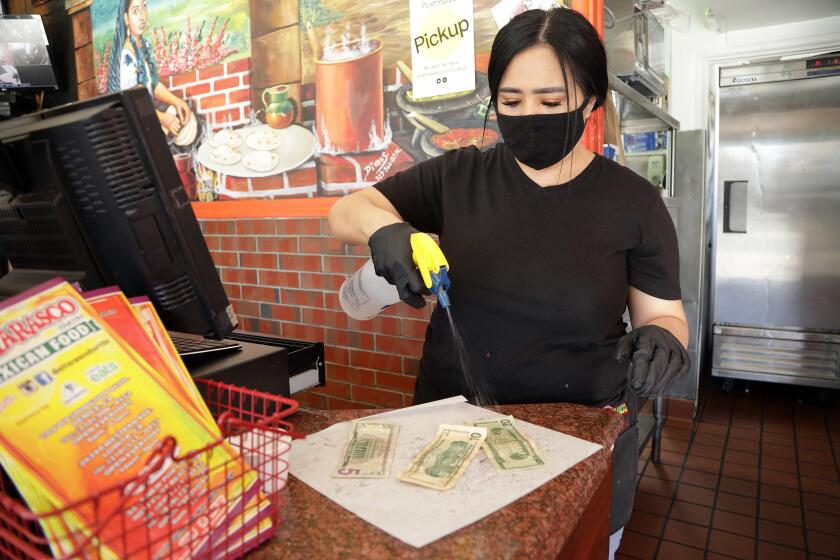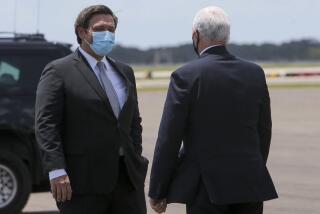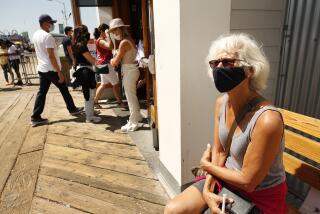With a COVID-19 death in Florida every 11½ minutes, this community fears who will be next
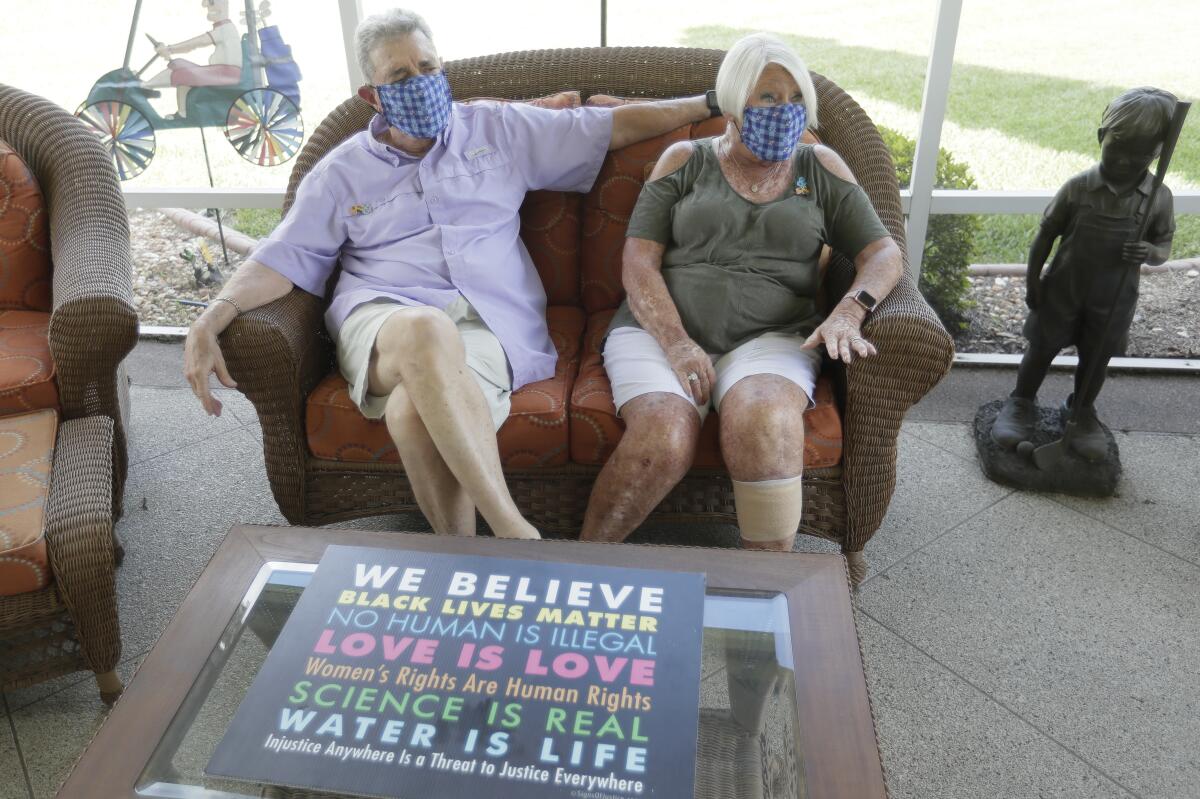
- Share via
THE VILLAGES, Fla. — Jack Forst and Don Garcy have been close friends longer than most elderly couples have been married.
For years they were neighbors in Longwood, Fla., where Forst was a marketing and sales executive for a beverage company and Garcy ran an insurance office. For the last decade they’ve lived near one another in the Villages, a sprawling retirement community not far from their old homes.
But when they met at a Starbucks on a recent rainy weekday morning, their greeting was infused with the fear that had gripped many across this state.
“My wife’s in quarantine,” Forst called across the lobby.
Garcy, 84, nodded but didn’t speak, as if a bemused character in a John Updike novel. He recently finished two months in quarantine himself; he’s become so accustomed to the blue cotton face mask he wears that he sometimes tries to eat with it on.
Forst and Garcy didn’t expect their lives to spool out this way, worrying about a pandemic in a nation on edge. They had endured Vietnam, civil rights marches, Kennedy assassinations, recessions, terrorist attacks and the scandal of Watergate — but this America is somehow different, less certain when it takes stock of itself in an age of fresh graves and hoped-for vaccines.
COVID-19 has ravaged Florida, with more than 271,000 testing positive and 2,467 dying from the virus in July alone. On Sunday, the state reported 78 new fatalities, an average of one every 11½ minutes over the past seven days. And that has taken a heavy toll on residents older than 65, who account for just 13% of the state’s coronavirus cases but 82% of the fatalities.
Los Angeles Times’ visual coverage of the coronavirus crisis
For them, contracting the virus reads like a death sentence.
“We’re in an age group where obviously it is a problem,” said Forst, 76. “Our caseload is increasing every day. The deaths are increasing.”
Word of a new COVID-19 case isn’t so much news as it is a conversation starter in the Villages, a master-planned community that has over 132,000 residents, three ZIP Codes and 55 golf courses. If it were a city, it would be the 16th-largest in the state — and nearly 80% of its residents are over 65.
News of rising infections arrive with unnerving frequency.
“It’s a reality. It’s a fact,” Forst said of the virus. “It’s always on everybody’s mind.”
The eerie sense of who might be next has changed the way some people live their lives. The Villages’ recreation guide, which Forst said was recently the size of a small-city phone book, was just 36 pages this week — with three of those pages devoted to COVID-19 precautions.
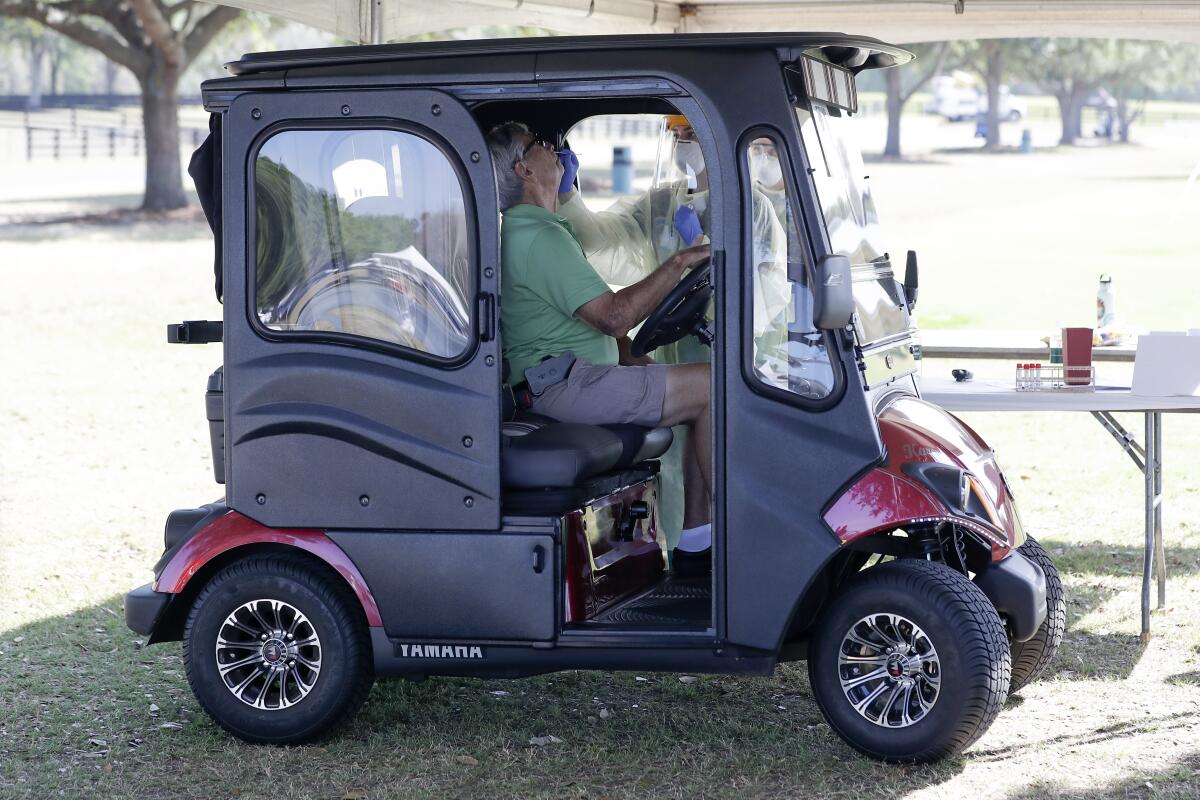
The golf courses are still busy, with players rushing along the 100-plus miles of paved cart paths at high speed. But the dugouts and bleachers at some of the community’s 11 softball fields have been cordoned off with yellow caution tape. Attendance is down in aerobics classes, and active people like Forst often find themselves in unwanted solitude.
“I am very vigilant as to where I go, what I do. I don’t go into crowds, quite frankly,” Forst said.
Garcy doesn’t either.
“I spend more time at home now,” he said. “I’ll get down in the morning and have coffee with two or three guys, come home, work a lot of puzzles.”
Wariness is the pose no matter where one travels in this state. Sixty miles southeast, in the Orlando offices of Dr. Venkatesh Nagalapadi, patients tell similar stories. Nagalapadi specializes in geriatric care, and most of his patients, many over the age of 65, have been hunkered down since COVID-19 surfaced this spring.
The virus built slowly but spiked sharply upward in June, after Republican Gov. Ron DeSantis allowed gyms and retail spaces to open with few restrictions and bars, restaurants, theaters and bowling alleys to operate at 50% capacity. Since then, Florida has seen over 363,000 people test positive, more than in any other state, with the infection rate of people older than 80 recently doubling in some places. Over the weekend, Florida passed New York as the state with the second-most COVID-19 infections with 423,855, trailing only California.
Nagalapadi said the waiting and fear had taken a toll on older people mentally as well as physically.
“Caution fatigue is what this is,” he said. “They’ve been on high alert and cautious for the last five months. And it gets to everyone, [but] I think it’s particularly affecting the 65-and-above demographic because they are more prone to stress.”
Jeff Johnson, the Florida director for AARP, a nationwide public-interest group working on behalf of people 50 and older, worries that precautions to protect against COVID-19 may be almost as bad as the disease. Staying home and limiting social contacts have their downsides.
“Loneliness will kill you. It’ll kill you slower than the virus, but it will also kill you,” he said. “And so as we have people isolated for longer periods of time while the virus is brought under control … we need to recognize that the status quo is dangerous as well and find ways to lessen that.”
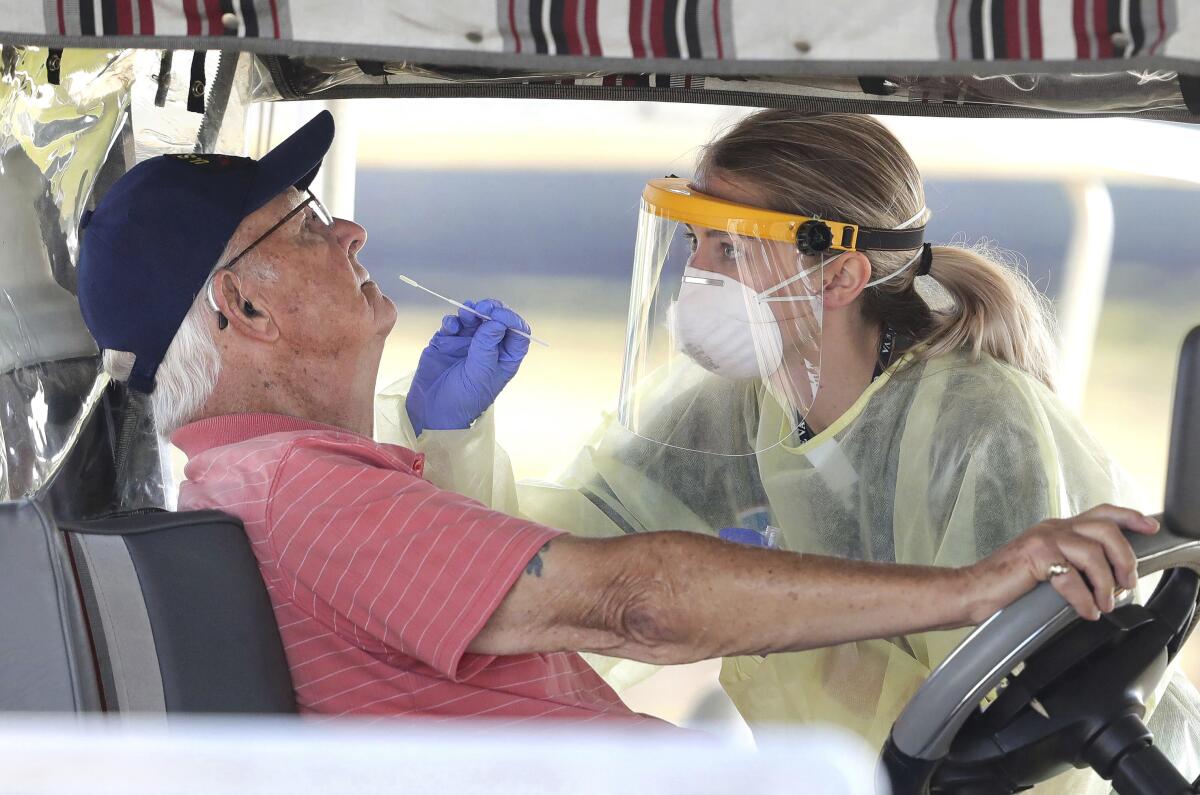
Johnson said there was also a need to resist the suggestion by some that sacrificing senior citizens was acceptable in order to reopen the badly damaged economy. Such sentiment has left the elderly feeling increasingly vulnerable.
Nagalapadi said his patients weren’t getting reassurance — or much of anything — from their political leaders, which could have consequences come November.
President Trump narrowly won Florida in 2016, thanks largely to voters 65 and over — 21% of the electorate — who backed him by 9 percentage points over Hillary Clinton. But the administration’s bungled response to the pandemic has left those most at risk to the virus exposed. Polls show presumptive Democratic challenger Joe Biden either tied with Trump or slightly ahead.
“We have our leaders kind of making this a political issue and coming up with talking points which are not rooted in science,” Nagalapadi said. “They communicate that it’s no big deal — even if you get the virus, you’re going to be OK — you don’t have to follow common-sense social guidelines. It’s a huge disservice to that vulnerable population.
“My patients come and ... say, ‘I heard this on TV. What are your opinions on that?’ And without getting political, I say, ‘I don’t think it’s true with regards to you.’”
Jon-Marc MacLean, lead pastor at Hope Lutheran Church, which sits across a wide boulevard from one of the Villages’ golf courses, said that a need for answers and comfort had brought many people to his door.
“The largest connecting point we have is through worship,” said MacLean. “A lot of it has to do with one-on-one calls and counseling. The biggest part for me is dealing with folks in the middle of actual loss, whether it’s from COVID or not.
“The disconnection is rampant,” he added. “The overwhelming fear among the pastors was that we were going to see a spike in suicides nationally because of people who are cut off and are not able to be in places where they would usually have support in a community.”
But these days of anger over politics and race make unity elusive.
“Red and blue as far as politics or black and white as far as skin —whatever it’s going to be,” MacLean said, “I think that’s created by fear. There’s a lot of people who are afraid. Everything is changing out of our control, so I don’t want anything in my control to change.”
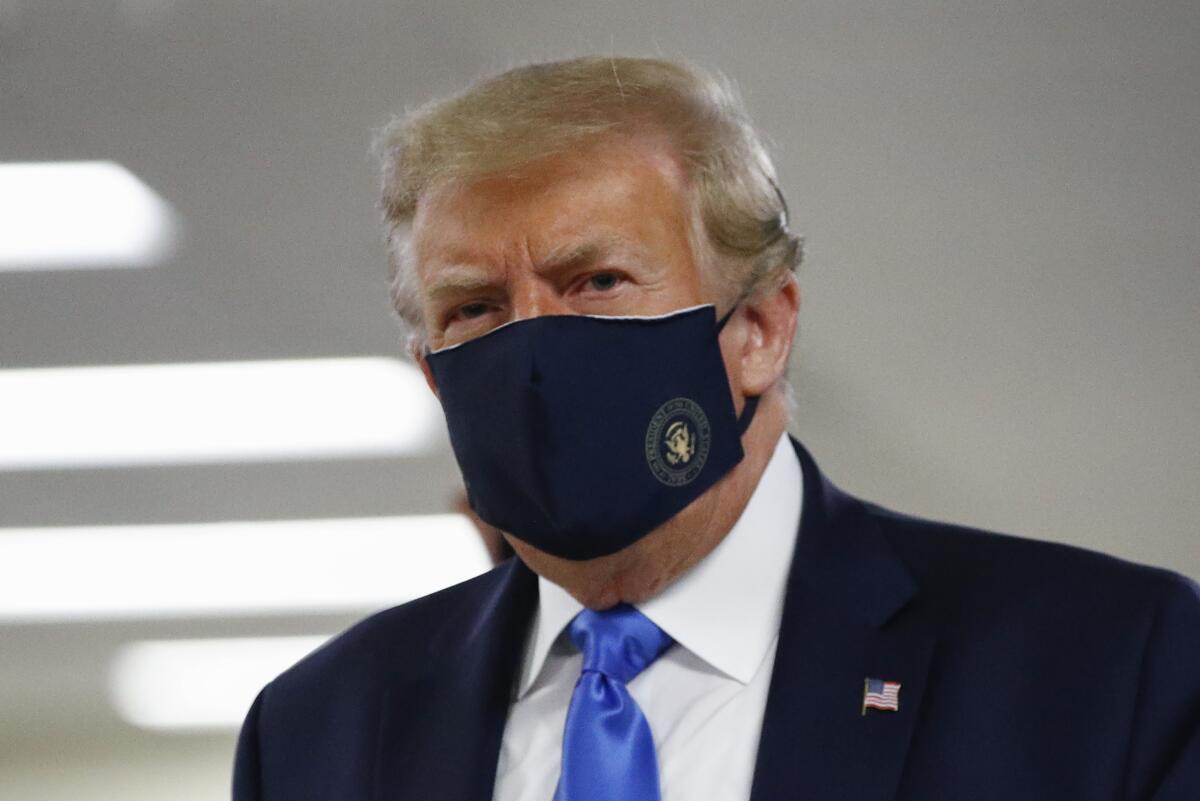
There is little confusion about politics in the Villages, a solid slice of red the president carried in 2016 with nearly 70% of the vote. This community is almost 98% white and about two-thirds Republican. But due in part to COVID-19, Trump’s support may be eroding here too.
Forst and Garcy, who both describe themselves as conservatives, will not be voting for Trump in November, largely because of his party’s response to the pandemic.
“It’s politicized at all levels. Statewide, everything,” Forst said. “This is a serious problem. They need to stop this nonsense and work together and get this country back on track.”
It’s hard to take it all in — stay safe, sane and not so alone — but what can a person do when danger lurks on the fairways and lingers in the bungalows?
“I’m trying to avoid that with the attitude and the physical stuff that I do each day,” Forst said. “Because hey, you either get on with living or get on with dying.”
More to Read
Sign up for Essential California
The most important California stories and recommendations in your inbox every morning.
You may occasionally receive promotional content from the Los Angeles Times.
